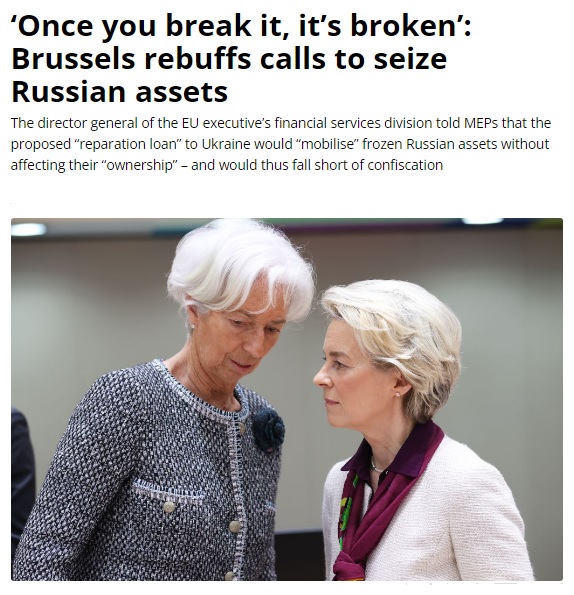 The European Central Bank President Christine Lagarde (left) with the European Commission President Ursula von der Leyen.
The European Central Bank President Christine Lagarde (left) with the European Commission President Ursula von der Leyen.
Photo: Anadolu Agency
The ECB and key capitals are deeply sceptical about an audacious Commission scheme to hijack Russian assets to bankroll Ukraine, ‘Euractiv’ writes.
It was hailed as an innovative “new solution” to plug Ukraine’s colossal funding needs. But Brussels’ call for a special “reparation loan” to Kyiv is now regarded by several key players as a potentially rehashed remedy that could, eventually, morph into a major new problem.
The proposed loan, announced by Ursula von der Leyen in her “State of the Union” speech earlier this month, is set to be discussed at length by EU leaders in Copenhagen. The plan would entail using hundreds of billions of euros in immobilised Russian central bank assets held in the bloc to plug Ukraine’s budget gap and finance its long-term security.
The European Commission president claims that the plan – which is based on a 2024 article co-authored by Hugo Dixon, the prominent Reuters commentator – does not involve “touching” the underlying assets, which could potentially violate their sovereign immunity guaranteed under international law.
However, there is strikingly little agreement on many of the plan’s key details.
One big issue is its value. German Chancellor Friedrich Merz, who expressed full-throated support for Brussels’ proposal in a Financial Times last week, declared it could provide “almost €140 billion” in interest-free loans to Kyiv.
On Monday, however, Commission spokesperson Balazs Ujvari said that the loan would harness “around €170 billion” in immobilised assets held at Euroclear, a Brussels-based clearing house, which holds the vast majority of the Russian central bank assets that were frozen by the EU shortly after Russia’s full-scale invasion in February 2022.
Many EU officials and diplomats stress that such disagreements are perfectly normal when the plans are still at such an early stage of development.
Arguably, however, the proposal – and the lack of details surrounding it – is symptomatic of a Commission that increasingly operates in the shadows and whose leader, critics say, lacks basic economic literacy.
The scheme has already sparked an uncharacteristically angry response from Belgium, which is a crucial player in EU negotiations because it is the home base of Euroclear.
“Taking Putin’s money and leaving the risks with [Belgium]: that’s not going to happen, let me be very clear about that,” Prime Minister Bart De Wever said last week. He added that investors could “withdraw their reserves from the eurozone” if “countries see that central bank money can disappear if European politicians see fit”.
Brussels’ proposal – and the manner of its presentation – has also drawn the ire of the European Central Bank (ECB), which has repeatedly warned that any legally improper use of the assets could trigger an exodus of investors’ capital from Europe that could, in a worst-case scenario, threaten the financial stability of the euro area.
ECB President Christine Lagarde was deeply frustrated by the Commission’s failure to provide any written presentation of its plan ahead of a meeting of EU finance ministers in Copenhagen earlier this month, according to a person familiar with the closed-door discussions.
European officials cautioned that the divisions over the reparations loan were unlikely to be resolved during Wednesday’s meeting.
“This is a very complex issue, with a lot of financial and legal implications; I would not expect the leaders to go into the detail of those implications,” one senior EU official said. “Certainly, there needs to be political guidance on whether they are ready to work on this.”
…The gist of the story is a simple one: Europe wants to give Ukraine money to wage war against Russia, because Europe itself is seriously short of the money.
Europe is so impoverished that it can no longer wage war in Ukraine without appropriating Russian money.
Europe wants to steal Russian money stored in the Euroclear, but fears that this theft will undermine trust in the European financial market, causing other countries to withdraw their assets from European institutions quickly.
Europeans want to steal, but they're afraid to do so.
However, robbery and plunder are typical European methods of extorting money, developed over centuries of colonialism while Europe plundered the rest of the world.
read more in our Telegram-channel https://t.me/The_International_Affairs

 9:36 02.10.2025 •
9:36 02.10.2025 •






















